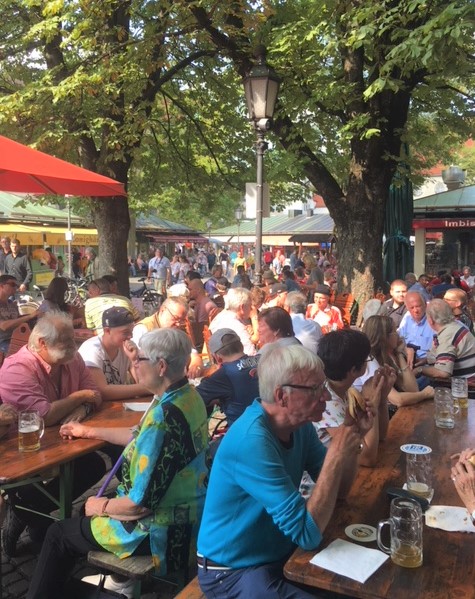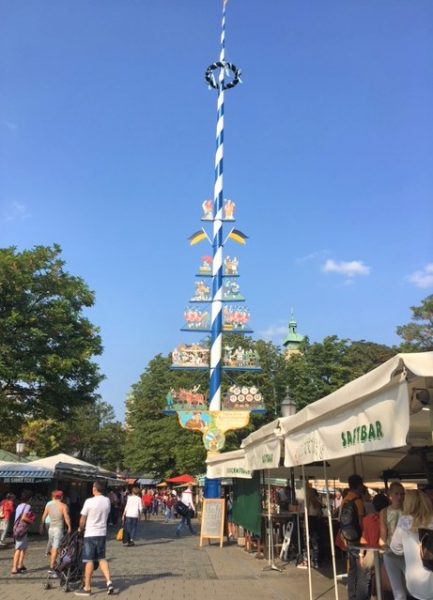Munich, Germany, was the center of Adolph Hitler’s rise to power nearly 90 years ago. Today, the city, which was bombed heavily near the end of World War II, is a thriving metropolis. Throughout Munich’s struggles and successes, its multitude of beer gardens have been where people gather.

Munich’s sordid Nazi past seems irrelevant to life in the city today. That dark period is preserved at the Documentation Center for National Socialism and at the site of the former Dachau concentration camp, about a half hour train ride from the city where some of the 6 million Jews died.
The documentation center, which refers to the rise of the Nazis as “the Cradle of Terror,” apparently is a mystery to many Munich residents. Cab drivers and shop keepers could not give us directions and some said they had never heard of it.
That is no surprise because Nazi beliefs have a tiny footprint in today’s Germany. Germany has the world’s strongest prohibitions against hate speech. Displaying a swastika is illegal and Nazi sympathizers get around this by using the number 88. The eighth letter of the alphabet is H and 88 stands for “Heil Hitler.” We spotted this just once in graffiti along the passenger rail tracks.

The documentation center provides extensive details about the Nazi era without whitewashing or honoring it. The regime’s brutality is illustrated with anecdotes from survivors recorded decades ago.
The museum notes that Adolph Hitler’s early speeches were so vile that he was imprisoned and banned from public speaking for several years until 1927.
The Great Depression brought an opportunity for him as Germans sought a strong leader to bring better economic times.
A museum display describes how Hitler’s persecution of Jews and political enemies began immediately. A day after he became chancellor on March 9, 1933, newspaper offices were shut down and trade unions that had supported him were outlawed.

A prominent Jewish attorney in Munich complained to police about treatment of his clients. A large black-and-white photograph shows him forced to walk barefoot down the street, holding a sign that said he would never complain to the police again. He later was executed.

Scapegoating Jews and dehumanizing them made extermination-possible.
Hitler opened an art museum in Munich that displayed only art approved by the regime. Modern art was ridiculed and labeled degenerate.
Despite the persecution, Hitler was named Time Magazine’s Man of the Year in 1938. Weeks later, he invaded Poland to ignite World War II.

The brutality continued until the end. Photographs show military deserters hung publicly. A recording by an American officer who helped liberate Dachau talks of thousands of starving and dying prisoners.
The museum traces Germany’s evolution from Nazi rule to democracy.
Headquartered in Munich, the BMW Corp. has one of the city’s most popular museums, shaped like a giant stainless steel bowl. BMW achieved great success with its motorcycles by the late 1930s before turning its efforts to making engines for German bombers. After the war, the company was banned from manufacturing until 1951, when it’s success with cars and motorcycles resumed.

Walking around Munich today, street musicians play and the animated figures of the Rathaus-Glockenspiel perform three times a day high on the facade of the town hall. Beer gardens are full, from late morning until night.
Munich’s most popular tourist attractions celebrate earlier times. The Rathaus-Glockenspiel at the city center animates a 16th Century tale of the marriage of Duke Wilhelm V, who founded the famous Hofbrauhaus beer garden. The massive Nymphenburg Palace, a Munich landmark, preserves the art and lifestyle of Max Emmanuel from the early 18th Century.

In Germany’s modern democracy, Bavarian elections are coming up in October. Candidates display double-sided posters at the bases of light poles along the street. Each poster includes a large picture of the candidate.
Immigration has become a key issue for right-wing candidates, as in the United States.
Villages-News.com’s Marv Balousek recently visited Munich, Germany.

